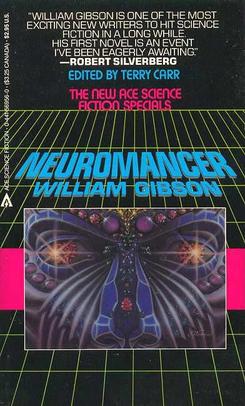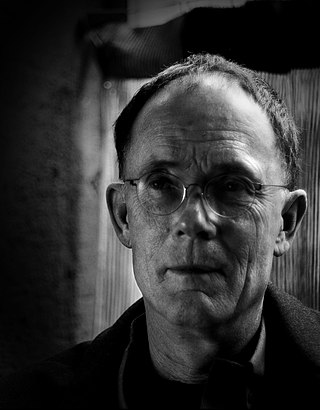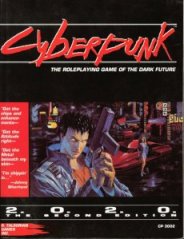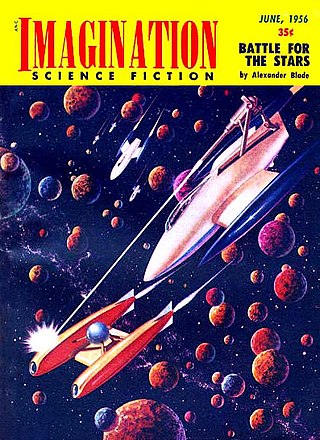
Cyberpunk is a subgenre of science fiction in a dystopian futuristic setting said to focus on a combination of "low-life and high tech". It features futuristic technological and scientific achievements, such as artificial intelligence and cyberware, juxtaposed with societal collapse, dystopia or decay. Much of cyberpunk is rooted in the New Wave science fiction movement of the 1960s and 1970s, when writers like Philip K. Dick, Michael Moorcock, Roger Zelazny, John Brunner, J. G. Ballard, Philip José Farmer and Harlan Ellison examined the impact of drug culture, technology, and the sexual revolution while avoiding the utopian tendencies of earlier science fiction.

Neuromancer is a 1984 science fiction novel by American-Canadian writer William Gibson. Considered one of the earliest and best-known works in the cyberpunk genre, it is the only novel to win the Nebula Award, the Philip K. Dick Award, and the Hugo Award. It was Gibson's debut novel and the beginning of the Sprawl trilogy. Set in the future, the novel follows Henry Case, a washed-up hacker hired for one last job, which brings him in contact with a powerful artificial intelligence.

Patricia Oren Kearney Cadigan is a British-American science fiction author, whose work is most often identified with the cyberpunk movement. Her novels and short stories often explore the relationship between the human mind and technology. Her debut novel, Mindplayers, was nominated for the Philip K. Dick Award in 1988.

William Ford Gibson is an American-Canadian speculative fiction writer and essayist widely credited with pioneering the science fiction subgenre known as cyberpunk. Beginning his writing career in the late 1970s, his early works were noir, near-future stories that explored the effects of technology, cybernetics, and computer networks on humans, a "combination of lowlife and high tech"—and helped to create an iconography for the Information Age before the ubiquity of the Internet in the 1990s. Gibson coined the term "cyberspace" for "widespread, interconnected digital technology" in his short story "Burning Chrome" (1982), and later popularized the concept in his acclaimed debut novel Neuromancer (1984). These early works of Gibson's have been credited with "renovating" science fiction literature in the 1980s.

Cyberpunk is a tabletop role-playing game in the dystopian science fiction genre, written by Mike Pondsmith and first published by R. Talsorian Games in 1988. It is typically referred to by its second or fourth edition names, Cyberpunk 2020 and Cyberpunk Red, in order to distinguish it from the cyberpunk genre after which it is named.

John Shirley is an American writer, primarily of horror, fantasy, science fiction, dark street fiction, westerns, and songwriting. He has also written one historical novel, a western about Wyatt Earp, Wyatt in Wichita, and one non-fiction book, Gurdjieff: An Introduction to His Life and Ideas. Shirley has written novels, short stories, TV scripts and screenplays—including The Crow—and has published over 84 books including 10 short-story collections. As a musician, Shirley has fronted his own bands and written lyrics for Blue Öyster Cult and others. His newest novels are Stormland and Axle Bust Creek.

Walter Jon Williams is an American writer, primarily of science fiction. Previously he wrote nautical adventure fiction under the name Jon Williams, in particular, Privateers and Gentlemen (1981–1984), a series of historical novels set during the Age of Sail.

John Milo "Mike" Ford was an American science fiction and fantasy writer, game designer, and poet.

Richard Kingsley Morgan, is a British science fiction and fantasy author of books, short stories, and graphic novels. He is the winner of the Philip K. Dick Award for his 2003 book Altered Carbon, which was adapted into a Netflix series released in 2018. His third book, Market Forces, won the John W. Campbell Award in 2005, while his 2008 work Thirteen garnered him the Arthur C. Clarke Award.

Broken Angels (2003) is a military science fiction novel by British writer Richard Morgan. It is the sequel to Altered Carbon, and is followed by Woken Furies.

John Joseph Vincent Kessel is an American author of science fiction and fantasy. He is a prolific short story writer, and the author of four solo novels, Good News From Outer Space (1989), Corrupting Dr. Nice (1997), The Moon and the Other (2017), and Pride and Prometheus (2018), and one novel, Freedom Beach (1985) in collaboration with his friend James Patrick Kelly. Kessel is married to author Therese Anne Fowler.
Biopunk is a subgenre of science fiction that focuses on biotechnology. It is derived from cyberpunk, but focuses on the implications of biotechnology rather than mechanical cyberware and information technology. Biopunk is concerned with synthetic biology. It is derived from cyberpunk and involve bio-hackers, biotech megacorporations, and oppressive government agencies that manipulate human DNA. Most often keeping with the dark atmosphere of cyberpunk, biopunk generally examines the dark side of genetic engineering and depicts the potential perils of biotechnology.
Since the advent of the cyberpunk genre, a number of cyberpunk derivatives have become recognized in their own right as distinct subgenres in speculative fiction, especially in science fiction. Rather than necessarily sharing the digitally and mechanically focused setting of cyberpunk, these derivatives can display other futuristic, or even retrofuturistic, qualities that are drawn from or analogous to cyberpunk: a world built on one particular technology that is extrapolated to a highly sophisticated level, a gritty transreal urban style, or a particular approach to social themes.

Science fiction is an important genre of modern Japanese literature that has strongly influenced aspects of contemporary Japanese pop culture, including anime, manga, video games, tokusatsu, and cinema.

The literary genre of science fiction is diverse, and its exact definition remains a contested question among both scholars and devotees. This lack of consensus is reflected in debates about the genre's history, particularly over determining its exact origins. There are two broad camps of thought, one that identifies the genre's roots in early fantastical works such as the Sumerian Epic of Gilgamesh. A second approach argues that science fiction only became possible sometime between the 17th and early 19th centuries, following the scientific revolution and major discoveries in astronomy, physics, and mathematics.
Many of the tropes of science fiction can be viewed as similar to the goals of transhumanism. Science fiction literature contains many positive depictions of technologically enhanced human life, occasionally set in utopian societies. However, science fiction's depictions of technologically enhanced humans or other posthuman beings frequently come with a cautionary twist. The more pessimistic scenarios include many dystopian tales of human bioengineering gone wrong.
John Meaney is a British science fiction author.
Japanese cyberpunk refers to cyberpunk fiction produced in Japan. There are two distinct subgenres of Japanese cyberpunk: live-action Japanese cyberpunk films, and cyberpunk manga and anime works.

Space opera is a subgenre of science fiction that emphasizes space warfare, with use of melodramatic, risk-taking space adventures, relationships, and chivalric romance. Set mainly or entirely in outer space, it features technological and social advancements in faster-than-light travel, futuristic weapons, and sophisticated technology, on a backdrop of galactic empires and interstellar wars with fictional aliens, often in fictional galaxies. The term does not refer to opera music, but instead originally referred to the melodrama, scope, and formulaic stories of operas, much as used in "horse opera", a 1930s phrase for a clichéd and formulaic Western film, and "soap opera", a melodramatic domestic drama. Space operas emerged in the 1930s and continue to be produced in literature, film, comics, television, video games and board games.














